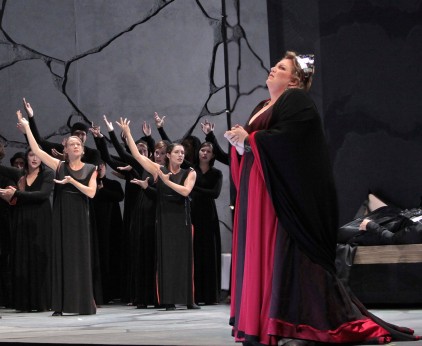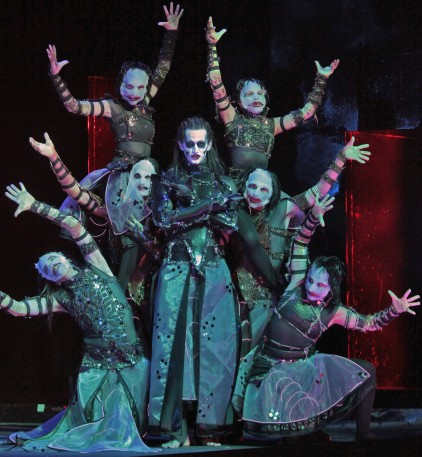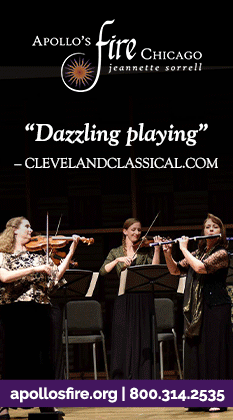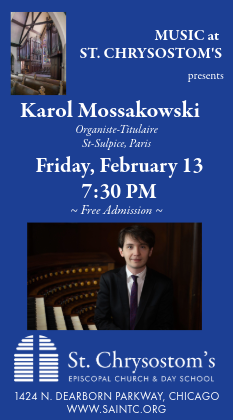Fine cast, glitzy production provide mixed rewards in Santa Fe’s “Alceste”

SANTA FE: In addition to offering the most unique setting for opera performance in North America, Santa Fe Opera is a company that historically enjoys a staging challenge. Among the works given U.S premieres on the New Mexico mountaintop are Britten’s Owen Wingrave, Janacek’s The Cunning Little Vixen, Zemlinsky’s A Florentine Tragedy, Shostakovich’s The Nose, Thomas Ades’ The Tempest, and a slew of Strauss, including Capriccio and Daphne.
Santa Fe has taken on yet another daunting assignment with the company premiere of Gluck’s Alceste, which opened Saturday night, with local favorite Christine Brewer in the title role.
There’s no denying Gluck’s rightful place in opera history nor the reforms he was largely responsible for. A firm believer in a more natural operatic approach, Gluck helped to bring about the jettisoning of da capo arias and extraneous coloratura excess in favor of a simpler, more expressive style that concentrates on the characters’ emotions.
In Thessaly, King Admete is dying and the high oracle states that the only way to save him is for another to give their life. None is willing except his queen, Alceste. Admete is unwilling to accept her self-sacrifice and much of the ensuing two-and-one-half hours concerns Alceste’s agonizing over her decision. Ultimately, Admete follows Alceste into death, and the god Apollo descends to announce that Alceste’s life has been spared due to honor and steadfastness.
For all Gluck’s innovations, Alceste still displays elements of the Baroque and French lyric tragedie, as with the prominence of the chorus of Thessalonians, reflecting the Greek Classical tradition. The finest of Gluck’s music in Alceste is extraordinarily beautiful, with remarkable choral writing that still sounds novel today.
Yet despite the innovations and attractive music, Gluck was not much of a dramatist, and a great deal of Alceste is repetitive exposition. This is one opera that can benefit from judicious pruning, and even for those unfazed by Handel’s da capo arias, Alceste’s unvaried aura of melancholy makes for a very long evening. Act 3, in particular, tries one’s patience, as Admete and Alceste tussle endlessly over who should be the one to die. As the clock nears the three-hour mark, you want to yell, “Somebody just do it already!”
Christine Brewer is a trouper for following through with her Santa Fe commitment even while laboring under a painful knee condition, as was evident in her limp on stage. By necessity, her movements were limited and for much of the long evening, Brewer was restricted to sitting still with a pained expression on her face, which underlined the static narrative and general atmosphere of relentless gloom.
Director Francisco Negrin has attempted to compensate for his sedentary soprano by revving up the stage action with energetic ballet sequences and a dramatically engaged chorus. Yet choreographer Ana Yepes’ vogue-ing and stylized movements for her dancers seemed a bit silly and distracting, particularly with their manhandling of Brewer during some of Gluck’s most memorable vocal set pieces.
Brewer brought the requisite regal dignity and ample soprano tone to the role one would expect. In the first two acts, her singing was rather generalized in expression, with a glassy hardness to top notes. The soprano rose to the final scene’s challenges superbly however, with an affecting, beautifully refined and nuanced Divinites du Styx.
In his Santa Fe debut, Paul Groves’ long experience with the role of Admete was manifest in the strength and credibility he brought to a rather weak character. The tenor’s top notes are now rather strained but he gamely entered into the production—even showing some admirable footwork joining the dancers at one point—and provided a welcome dramatic frisson to Alceste, au nom des Dieux.

As The Infernal God/Oracle, bass-baritone Tom Corbeil conveyed apt malignant swagger and vocal darkness despite laboring under the white makeup and bizarro costume getup for the villain and his acolytes—Marilyn Manson meets Ming the Merciless.
Jennifer Forni provided a ray of warmth and stage charisma to Coryphee. Wayne Tigges managed to make the climactic appearance of Hercules as Admete’s wingman, seem less ridiculous than usual. Nicholas Pallesen as the Herald and High Priest, Aaron Blake as Evandre and Matthew Morris as Apollo filled their roles with vocal distinction.
Conductor Kenneth Montgomery enforced Baroque style with a light hand and idiomatic touch. Under Susanne Shelton’s direction, the chorus had more technical lapses than usual opening night but considering their almost-constant stage presence and complex movements, otherwise vividly fulfilled their collective role as one of the opera’s main components.
Louis Desire’s vaguely futuristic sets wedded the ancient and modern gracefully, and it was nice to see further use made of the massive sphere that debuted last year in Saariaho’s Adriana Mater. But how many times can that “La mort” banner be unfurled in one evening?
Santa Fe Opera’s production of Gluck’s Alceste runs through August 19. www.santafeopera.org; 505-986-5900, 800-280-4654.
Posted in Uncategorized






Posted Aug 03, 2009 at 8:43 pm by jutes
This is an honest review of an enjoyable opera experience. I agree about that banner (enough already) and the Marilyn Mansonesque garb of the “Styxians” (Apollo was especially weird for a Sun-God), but the music and the singing were compelling enough to ignore some of the odd juxtapositions. Dance is frequently hard to insert into the flow of such a big piece, and overall, I didn’t mind it, since it was professional and competently performed. One wonders how this period piece might have looked with period-style costumes…it is not always necessary to be new to be memorable, and Santa Fe is a destination that understands the unchanging characteristics of things. Still, it was truly refreshing to see a piece that is rarely performed, and kudos to the Santa Fe Opera for bringing us something different rather than another old opera warhorse!
Posted Aug 04, 2009 at 9:47 am by Nick del Vecchio
What a pleasure to read a clear and interestingly written review. Thank you, Nick del Vecchio,Director livingattheopera.com